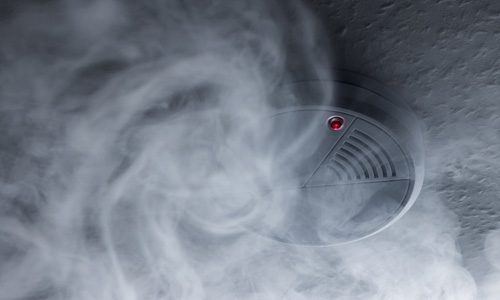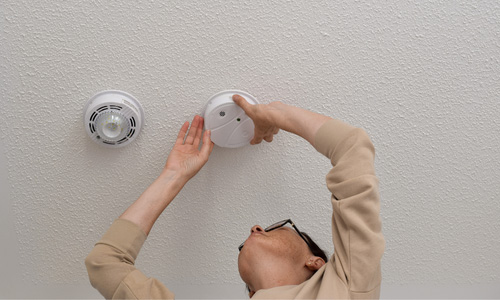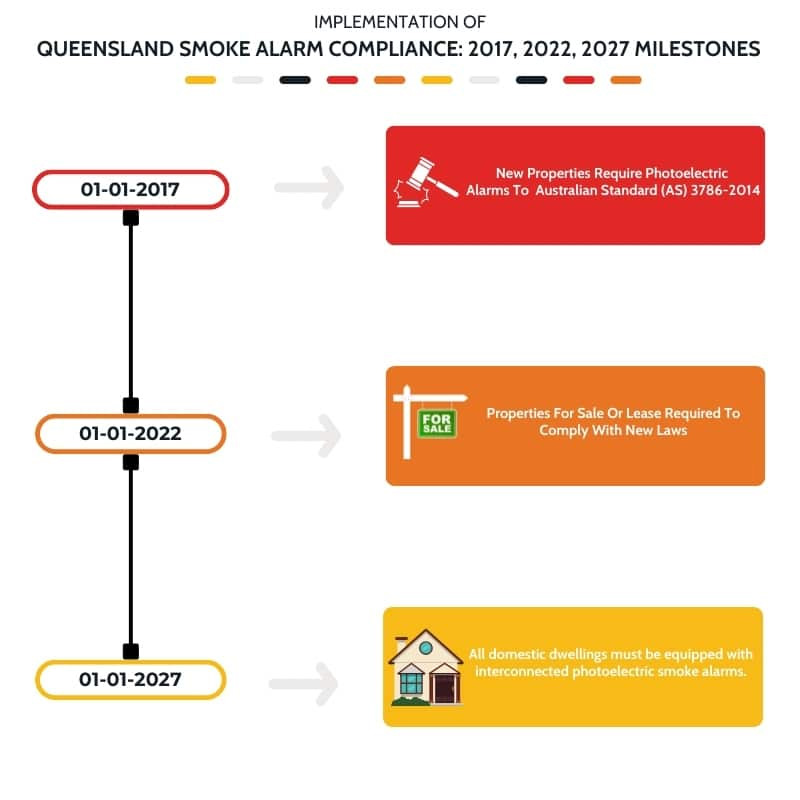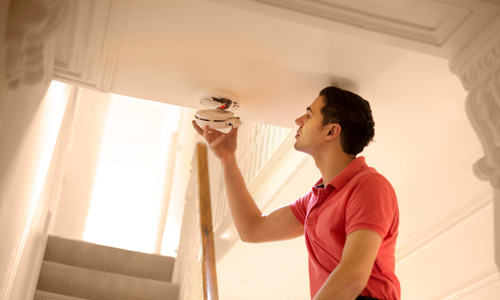
Queensland homeowners face a critical deadline that many are still unprepared for. By 1 January 2027, all existing private homes, townhouses, and units throughout Queensland must be fitted with interconnected photoelectric smoke alarms. Understanding Queensland smoke alarm compliance requirements is essential for meeting this deadline. While this might seem like a distant date, the complexity of meeting these requirements means now is the time to start planning.
The stakes couldn't be higher. House fires can spread rapidly, and those precious extra minutes of warning that properly installed smoke alarms provide often mean the difference between a close call and a tragedy. Yet despite the importance of compliance, many property owners are still unclear about what exactly is required and whether they can tackle the installation themselves.
Understanding Queensland's Smoke Alarm Laws
Since 1 January 2017, legislation has specified the type, positioning, and interconnectedness of smoke alarms for Queensland homes. The current requirements aren't just about having any smoke alarm on your ceiling. The law specifically mandates photoelectric smoke alarms that are interconnected throughout the property.
What does this mean in practical terms? Every bedroom, hallway connecting bedrooms to the rest of the house, and each level of your home must have a compliant alarm. These alarms must be interconnected so that when one detects smoke, they all sound simultaneously. Additionally, they need to be either hard-wired to the mains power supply or powered by a non-removable 10-year battery.
The Queensland Government's official smoke alarm page provides comprehensive details about these requirements, but interpreting and implementing them correctly requires professional expertise.

The DIY Temptation and Its Pitfalls
Many homeowners see battery-operated smoke alarms at hardware stores and assume they can handle the installation themselves. While basic battery alarms are certainly better than no protection at all, they often fall short of meeting Queensland's smoke alarm compliance standards.
Consider the interconnection requirement alone. True interconnected systems require careful planning of cable routes, proper electrical connections, and testing to ensure the entire network communicates effectively. A single wiring error can compromise the entire system's reliability.
DNA Queensland Electrical’s professional smoke alarm installation specialists on the Sunshine Coast regularly encounter homes where well-meaning DIY attempts have resulted in non-compliant installations. Common issues include incorrect placement (too close to air conditioning vents or cooking areas), inadequate coverage, and improper interconnection that fails during testing.
Why Professional Installation Makes the Difference
When you engage qualified electricians for smoke alarm installation, you're not just paying for someone to mount devices on your ceiling. You're investing in comprehensive compliance expertise that covers every aspect of the installation.
Professional installers understand the nuances of Australian Standard AS 3786, which governs smoke alarm placement and installation. They know that alarms should be positioned at least 300mm from walls and light fittings, away from air conditioning vents, and never in areas where cooking fumes might trigger false alarms.
More importantly, licensed electricians can legally connect hardwired systems to your home's electrical supply. This connection provides the most reliable power source and often includes battery backup for continued protection during power outages. DIY enthusiasts simply cannot legally perform this type of electrical work in Queensland.

The Compliance Process: What to Expect
A thorough professional assessment begins with evaluating your home's layout and existing electrical infrastructure. Our experienced technicians will identify optimal alarm locations, plan cable routing for interconnected systems, and ensure coverage meets current standards.
The installation process involves more than just mounting alarms. Professional services include testing the interconnection functionality, programming any required settings, and ensuring all work meets Australian Standards. While compliance certificates aren't legally required in Queensland, many professional installers provide documentation of their work for your records.
For property owners across the Sunshine Coast region, proper documentation of professional work is becoming increasingly valuable. Real estate transactions now routinely include questions about smoke alarm compliance, and insurance assessments may consider whether systems meet current standards.
Planning Ahead for 2027
With the Queensland smoke alarm compliance deadline approaching, many electricians are already experiencing increased demand for installations. Property owners who wait until the last minute may face longer wait times and higher costs as demand peaks.
Starting the compliance process early also allows time to address any unexpected challenges. Older homes might need additional electrical work to support hardwired systems, or unique architectural features might require creative solutions for proper alarm placement.
Making the Right Choice for Your Family
The decision between DIY installation and professional services often comes down to more than just cost. While purchasing basic alarms from a hardware store might seem economical initially, non-compliant systems can lead to significant expenses later. These might include reinstallation costs, potential insurance complications, or delays in property transactions.
Professional installation provides peace of mind that extends beyond regulatory compliance. You'll know your family has the best possible protection, installed according to manufacturer specifications and industry best practices.
For detailed information about current compliance requirements and to schedule a professional assessment, property owners can visit comprehensive resources about smoke alarm compliance to better understand what's involved in meeting Queensland's safety standards.
 Taking Action
Taking Action
Queensland's smoke alarm legislation represents a significant step forward in residential fire safety, but compliance is only effective when systems are properly installed and maintained. As the 2027 deadline approaches, homeowners who act now will ensure their families have the protection they deserve while avoiding the stress of last-minute compliance efforts.
Whether you're a current homeowner looking to upgrade your system or a property investor ensuring your assets meet regulatory requirements, professional guidance can help navigate the compliance process efficiently and effectively.
Ready to ensure your property meets Queensland's smoke alarm requirements? Contact our team to schedule a compliance assessment and learn how professional installation can protect both your family and your investment.





















































